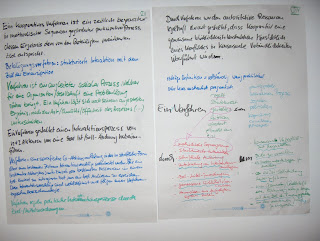Founded in 2005 by both practitioners and theorists, this network around an email list of over 60 participants aims to advcance the theory and practice of participatory procedures, and to unify the knowledge, and discourse of the many different subscenes of participatory, deliberative, cooperative, learning, change management, conflict resolution, problem resolution and other procedures. With three to four official meetings per year, Procedere organizes a dialogue between theory and practice.
 The Central Idea Of Procedure
The Central Idea Of ProcedureCentral to Procedere is the idea of "procedure", which is the key answer to what Procedere identifies as the main question of our time: the question HOW we do things, organize interactions, such as communication, trade, politics, in short: societal practice.
What is a procedure, then? A "procedure" is a "process guided by intentions", as opposed to a process that is just a sequence of unintended events. Basically, all human action (as opposed to behaviour) takes the form of procedures, though it's not always "process-smart", that is, conscious of it's own character as a process; and though all procedures have unintended side-effects.
 Procedere's founder Raban Daniel Fuhrmann proposes to subsume all possible manners of proceedings, such as programs, algorithms, strategies, methods, techniques, modes and models, under the family name of "procedure", with the further proposition that they are aimed to resolve given problems. Fuhrmann views all of human history through the prism of procedures, arguing that the history of human inventions is really a history of man-made procedures, and that improvements in procedure, in "HOW we do things", has made all the difference in the progression from tools of stone to agrarian improvement, printing, trading, adminstration, and upt to the industrial, and the digital revolution.
Procedere's founder Raban Daniel Fuhrmann proposes to subsume all possible manners of proceedings, such as programs, algorithms, strategies, methods, techniques, modes and models, under the family name of "procedure", with the further proposition that they are aimed to resolve given problems. Fuhrmann views all of human history through the prism of procedures, arguing that the history of human inventions is really a history of man-made procedures, and that improvements in procedure, in "HOW we do things", has made all the difference in the progression from tools of stone to agrarian improvement, printing, trading, adminstration, and upt to the industrial, and the digital revolution.As one of the three initiating founders of Procedere, I share and advance all these views.
Participatory Procedures
The rise of participatory procedures in all different forms is seen as an indication that "procedure has become a problem" itself, and is a deeply political issue. Since participatory procedures - from Large Group Interventions to facilitation methods and models to Multistakeholder Processes - are innovative expressions of ways how people should best interact, they are believed to be treasure chests, and experimental examples, of procedural know-how in action.
In other words, what is so exciting to Procedere people is not that participatory procedures are participatory, (or deliberative, cooperative etc. for that measure), but that they are procedures, intentional processes, certain sequences of interaction. They are figures or shapes of time, "Zeitgestalten", intentional patterns over time.
Again, I share and advance all these views.
The Importance Of Time
Consequentially, Time is a central phenomenon to proceduralists. Procedere distinguishes between chronos, and kairos. Chronos is the driving beat of the rhythm of the irreversible progress of time, time in a quantitative sense. Kairos denotes the quality of a given time: a special, and ripe moment, such as a tipping point, a turning point, a low point, a point of no return, or a window of opportunity. Chronos and kairos define the temporal chain of situations, as guided by any procedure: first, do A and B, secondly, do x and y, and thirdly, begin parallel work on this and that...
I sure share and advance those views!
 First Issues of Procedere: Typology, Competence
First Issues of Procedere: Typology, CompetenceOne of the first aims was to establish a typology of cooperative procedures.
The definition of a cooperative procedure is as follows: "A cooperative procedure guides a regulated process of interaction, achieving agreed upon goals through a composition of methods" (from the taxonomy-workshop in Heidelberg, March 2006). Fuhrmann distinguishes between methods (short term, measured in minutes), procedures (Verfahren) in a narrow sense of (median term - measured in hours or days), projects (long term, measured in weeks or months) an organizations (no deadline).
These distinctions my vocabulary does not share, because I'm not burning up such precious vocabulary to denote mere chronological characteristics.
In March 2009, Procedere will hold its second workshop at the Evangelic Academy in Loccum, this time on procedural competence. We will ask what skills designers of procedures need to have, what kind of abilities, but also what kind of authority and responsibility for the whole of the process. The aim is to identify what makes you a master of procedural design. I'll discuss competence in more detail later.





Keine Kommentare:
Kommentar veröffentlichen